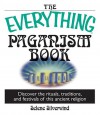Currently reading
I liked this book, and didn't like it.

I like that the connections with antiquity are found in classic literature, such as Byron, Shelly, and Swinburne, rather than insisting on connection with some kind of lineage that goes back to ancients. I have a theory that while there was "a witchcraft" in pretty much every religion and culture throughout history, Wicca itself, and by extension most modern paganism, is a modern invention of many different things taken from different places.
After reading this I feel like I have a much better handle on both the Dorothy Clutterbuck and Margaret Murray issues that one hears so much about on Teh Intarwebz.
I liked learning more about the Masons and their connection and similarities to early labor unions and guilds.
Where I found myself floundering with the book was in the sections on "cunning folk", which left me feeling the way I did when I was wallowing through Colin Wilson's "The Occult"--indeed, at one point, Hutton acknowledges a literary debt to Wilson.
Towards the end there is also a bit of a dank feel, as the Gardnerian, Alexandrian, and subsequent traditions are expounded on, and the comings and goings of the players on the stage traced. The value in this is only in being able to find out where to go for more information.
There were many enjoyable moments in this book, and equally as many "Is this something I really *need* to know?" moments. As with any book of this much academic depth, I could probably benefit from reading it again sometime down the road.










